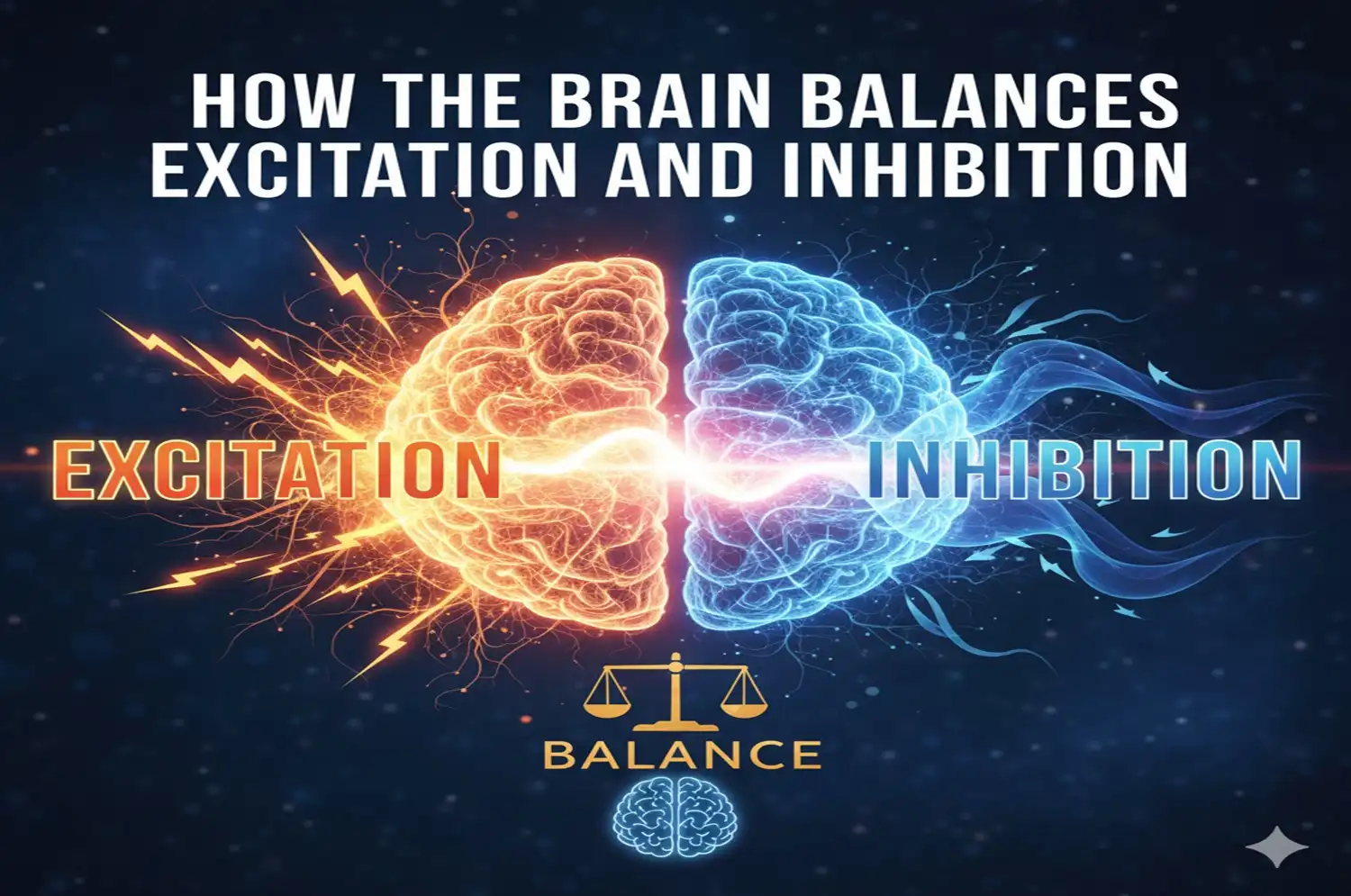Ever wondered how the brain balances excitation and inhibition while keeping you alert and active? Your brain achieves this delicate equilibrium by exciting some neurons and inhibiting others, preventing chaos and ensuring smooth functioning. This balance is crucial for learning, memory, and overall brain health. In this guide, we’ll break down how the brain balances excitation and inhibition in simple terms.
Table of Contents
ToggleWhat Is Excitation and Inhibition in the Brain?
Excitation Explained – Activating Neurons
Excitation occurs when neurons are activated to send signals across the brain. Excitatory neurotransmitters like glutamate play a key role in this process, enabling learning, memory formation, and rapid responses. Everyday activities, from solving a problem to reacting to stimuli, rely on precise neuronal excitation.
Inhibition Explained – Calming Neurons
Inhibition, on the other hand, prevents neurons from overfiring, maintaining brain stability. GABA, the primary inhibitory neurotransmitter, calms neuronal activity and protects the brain from overstimulation. This balance is essential for focus, emotional regulation, and overall cognitive health.
Understanding how the brain balances excitation and inhibition is crucial for insights into mental health, learning efficiency, and neurological disorders.
How the Brain Maintains a Balance
The Role of Neural Circuits
Excitatory and inhibitory neurons work in tandem to regulate brain activity. While excitatory neurons trigger signals, inhibitory neurons control excessive firing, ensuring stability. This precise coordination is key to how the brain balances excitation and inhibition.
Feedback Mechanisms
The brain uses feedback loops to maintain homeostasis. These mechanisms monitor neural activity, adjusting excitation and inhibition levels to prevent overactivity or underactivity, supporting optimal cognitive function.
Brain Regions Involved
Different regions contribute uniquely. The cortex processes sensory input and higher cognition, the hippocampus manages memory, and the cerebellum coordinates motor control—all relying on balanced neural activity to function efficiently.
Why Excitation-Inhibition Balance Matters
The brain’s ability to maintain a stable excitation-inhibition balance is crucial for overall neurological health. Proper regulation prevents disorders like epilepsy and anxiety, ensuring neurons don’t become overactive or underactive. This delicate balance also supports cognitive functions such as memory, attention, and learning, enabling the brain to process information efficiently. Moreover, it plays a key role in shaping mood and behavior, influencing how we respond to stress and interact with our environment. Understanding how the brain balances excitation and inhibition is essential for unlocking insights into both mental wellness and cognitive performance.
Signs Your Brain’s Balance Might Be Off
Understanding how the brain balances excitation and inhibition is crucial for mental clarity, focus, and overall brain health. When this balance is disrupted, it can affect mood, cognition, and behavior.
Symptoms of Excess Excitation
Too much neural activation can make you feel anxious, restless, or easily overstimulated. You may experience racing thoughts, trouble sleeping, irritability, or heightened sensitivity to sensory input.
Symptoms of Excess Inhibition
Excessive inhibition slows neural activity, often leading to fatigue, brain fog, lack of motivation, or difficulty concentrating. You may also feel emotionally numb or disconnected from your surroundings.
Maintaining the delicate balance between excitation and inhibition is key to optimal brain performance and emotional stability.
How to Support a Healthy Brain Balance
Lifestyle Tips
Maintaining a balanced brain starts with daily habits. Quality sleep, regular exercise, and effective stress management are crucial for regulating neural activity. These practices help your brain maintain how the brain balances excitation and inhibition, keeping it alert yet calm.
Nutrition & Supplements
Your diet directly influences brain function. Omega-3 fatty acids, antioxidants, and essential vitamins support neuron health and the delicate balance between excitation and inhibition. Eating nutrient-rich foods helps the brain function optimally.
Mental Exercises
Engaging the mind is equally important. Meditation, brain games, and learning new skills strengthen neural pathways and promote how the brain balances excitation and inhibition, enhancing cognitive resilience and focus.
Read Also:
Best Superfoods for Weight Loss and Energy Boost
FAQs:
-
What does excitation and inhibition mean in the brain?
Excitation activates neurons to send signals, while inhibition calms them, preventing overactivity.
-
How does the brain control overstimulation?
Inhibitory neurons release chemicals that dampen excessive activity, maintaining neural stability and focus.
-
Can lifestyle changes affect brain balance?
Yes, sleep, exercise, stress management, and nutrition significantly influence excitation and inhibition balance.
-
What happens if the brain’s balance is disrupted?
Disruption can cause anxiety, seizures, cognitive impairments, or mood disorders due to neural misfiring.
-
Are there ways to naturally boost inhibitory function?
Meditation, omega-3 intake, antioxidants, regular exercise, and mental challenges enhance inhibitory neuron efficiency.









